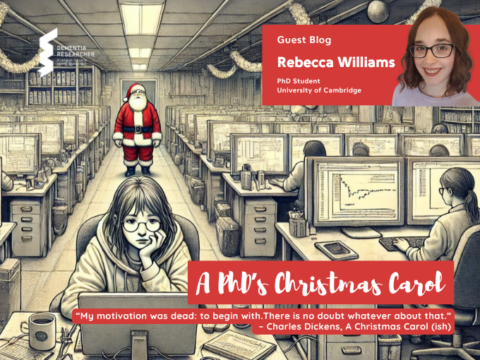After a long and festive day in December I returned to my office to find a small Christmas card sat waiting on my desk. In it were the usual festive greetings along with the following: “Thanks so much for all you do for the research culture at the unit”. Much like an IgNobel prize, this achieved two things: 1. It made me smile, and 2. It made me think. Until I read that message I’d never really thought about my impact on the culture where I work. Research culture is something set by programme leaders and generally people much more official than me. I’m just a small PhD student. How could I possibly have an impact? I’ve pondered the question for a month now and think it all boils back to one thing… board games.
About 6 months ago, I set up a board games night open to everyone at our unit. I am incredibly proud of the vast and ridiculously nerdy collection of board games currently stored in my flat. From Catan to Cluedo, Rummy to Risk; me and my partner have amassed as many games as can fit into our admittedly small home. Hiding them under tables and countertops, on top of wardrobes and behind doors, burrowing ourselves ever deeper into armies of dice and meeples. The idea to bring my hoard to work started when someone requested more socials ‘for introverts’ and soon became a fully-fledged, monthly evening of games. Every time we start the same thing happens; people walk in awkwardly, PhD students and professors alike, standing around the tables I’ve set up and staring longingly at the array of snacks. I always worry slightly that we’ll stay in that limbo forever, but inevitably within 30 minutes I find myself laughing at a ludicrous piece of strategy or tangential conversation about the permanency of God (we’re still academics after all). It’s inspired me to set up other clubs, gradually coaxing my colleagues down a rabbit hole of dungeons, and perhaps even dragons. I didn’t start board games night because I thought it would have a huge impact on research culture, I just thought it would be fun. And perhaps that’s the trick.
I’ve been told before that I “step out of the mould” in ways that I really don’t consider revolutionary. Honestly, I just try to have a bit of fun. Even when writing exams I got my highest grades when choosing to write essays that I’d never seen before but would be exciting to write. I include jokes at the end of my emails to my supervisor, topical of course, because I like to imagine it makes him smile to read truly terrible puns about Bayesian statistics. I start my presentations with music recommendations for fellow lab members. I have a tiny rubber duck sat on my desk that I like to think is known more widely around the unit than I am. Despite these consistent displays of oddness, I’ve never had someone tell me to stop. I’ve never regretted adding a joke into my presentations about technical imaging analyses.
I think sometimes as academics we forget that our colleagues are roughly as human as we are. We spend so much time trying to convince others and ourselves that we deserve to be here, and we forget that most people feel exactly the same. In my earlier years I would exclude jokes because I was worried people would think me childish or silly. I wouldn’t have had the courage to start a board games club in case someone thought me weird or nerdy. Most unforgivably, I think I would have hidden my tiny rubber duck in a pencil case rather than displaying him proudly on my desk. I worried a lot about being taken seriously. Especially as a young, Northern woman, I worried people wouldn’t see me as a serious academic if I showed an ounce of fun. Or perhaps more accurately if I showed an ounce of personality.
Did you know that the word serious has two meanings? One is to be carefully considered, such as the serious matter of a serious academic, but the other is to be sincere. Synonyms include earnest, wholehearted, and genuine. Perhaps at some point I realised being a serious academic meant more than being disciplined and intellectual. Being a serious academic meant being me. Accepting that I can be disciplined, but that doesn’t mean I have to scrub every bit of personality from my work. I can be professional, while still having fun. I can do good science, whilst having a tiny rubber duck sat at my desk.
So, how can one small PhD student have an impact on research culture? I think in the same way everyone can, by finding the fun and by showing ourselves. My friend was so nervous to start knitting in lectures, but since she started so many people have asked her about it. No speaker has ever gotten angry at her quietly creating a pair of socks in the third row. Instead she shares a bit of her personality, and everyone around her smiles. When I drew a Christmas tree on our office whiteboard, no one came in to erase it, but someone did come in to add tissue paper decorations. Of course, no-one should ever share more than they’re comfortable with, but trying to inject a bit of whimsy into our lives is something I think everyone can do. Use mythological analogies when explaining computational models. Adamantly proclaim your favourite mug to your supervisor. Call the tiny rubber duck on your desk Carlos! Remember that entering the office doesn’t mean leaving yourself at the door – so why not add a bit of whimsy to our research culture?

Rebecca Williams
Author
Rebecca Williams is a PhD student at the University of Cambridge. Though originally from ‘up North’ in a small town called Leigh, she did her undergraduate and masters at the University of Oxford before defecting to Cambridge for her doctorate researching Frontotemporal dementia and Apathy. She now spends her days collecting data from wonderful volunteers, and coding. Outside work, she plays board games, and is very crafty.

 Print This Post
Print This Post







Very proud of you ! Love Aunty Jean x x